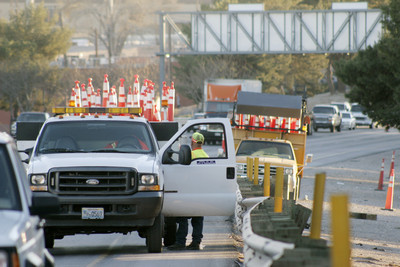Road workers in harm’s way

The bright orange cone had strayed onto the inside travel lane of Interstate 215, as cones often do on valley roadways.
It was Tom Yanuzis’ job to snatch the cone before it caused a vehicle to swerve and possibly crash.
The way Yanuzis co-workers tell it, the Nevada Department of Transportation maintenance worker was trying to make the roads safer for his fellow Nevadans.
It was about 11 a.m. on a clear day a few weeks back. Yanuzis and Mike Braddy were traveling in a large white pickup. The strobe lights on the truck were flashing — a signal for motorists to slow down — when the team pulled onto the shoulder of the busy freeway near the exit to Interstate 15 south.
Yanuzis jumped out of the truck. He went to snag the cone.
The blue Honda Accord came from around a bend in the road, seemingly out of nowhere, Braddy said.
Yanuzis was hit.
“He went flying, 10 feet in the air,” Braddy said of his co-worker.
The driver of the Accord slammed on his brakes and Yanuzis landed on the front hood before rolling onto the ground.
Braddy ran to him. “When I first seen him, I thought he was dead. Then he rolled over,” Braddy said.
Yanuzis was moaning. Blood covered his face.
Other motorists stopped and Braddy ran to call for help.
Emergency workers were on the scene within two minutes, Braddy said. Yanuzis was rushed to a hospital.
Braddy said he was in shock after watching his comrade get hit. “I was mad too. It made me angry.”
Braddy believed the Accord was traveling above the speed limit and could have even maneuvered out of the way. According to officials, no charges have been brought against the driver.
Yanuzis, a father and husband, is one of the lucky road workers. He’s in a lot of pain, but still alive after his encounter with one of the automobiles prowling our highways and byways.
He was not up to talking about what happened, but his father, Ted Yanuzis, described his son’s injuries.
The small bone in his lower left leg was broken, his wrist was shattered, his elbow and shoulder were dislocated, he had compound fractures of his arm and shoulder, and a broken collar bone. Yanuzis also suffered bruising all over and road rash.
“He left his teeth on the 215 and half an eyebrow,” Ted Yanuzis said with a laugh, explaining it was his son’s joke. At least, Yanuzis didn’t lose his sense of humor.
He’s fighting a severe infection and is in a tremendous amount of pain, his father said. His recovery is probably going to take at least six months.
His story is “a grim reminder of how dangerous it is working on our highways,” said Susan Martinovich, director of the Transportation Department.
Yanuzis’ injury came just before National Work Zone Awareness Week. That’s the week when workers try to remind the public that they have a fairly dangerous job.
Martinovich said she understands that work zones can be frustrating for motorists. “But they are a sign of a vibrant community.”
According to the Federal Highway Administration, work zone deaths have increased 45 percent from 1996 to 2006, when there were 1,010 fatalities. Of those killed, 85 percent were drivers or passengers.
It has been more than a decade since Transportation Department worker Frank Fuentes was killed by a drunken driver in Las Vegas.
Martinovich said the crashes are often caused by unsafe driving, specifically motorists driving too fast, following other vehicles too closely or ignoring construction signs.
“It’s a shame,” Martinovich said. “We don’t want to lose any more people.”
Motorists need to slow down when they see warning signs, lane-closure alerts, flaggers and detours, she said.
Drivers should also try to keep up with construction reports. They can do so by calling 511 or checking the Transportation Department Web site to learn about the latest road digging.
I had a chance to speak with some of Yanuzis’ work mates. They all are wishing him a speedy recovery, and talking about how scary it is when a two-ton piece of metal is bearing down on you at 65 mph.
One worker said his hand shakes every night he leaves work.
For his part, Braddy said he can’t afford to be nervous, just cautious.
That doesn’t stop him from thinking about it. “I think about my mom and my sisters and how this could happen to me,” Braddy said.
Too often, Braddy said, drivers just aren’t paying attention — gabbing on a cell phone, eating a sandwich, putting on makeup, changing the radio station.
“We’re trying to keep the public safe,” Braddy said. “We wish when drivers see us out there that they give us the courtesy and respect to slow down and get out of the way.”
Contact reporter Francis McCabe at fmccabe@reviewjournal.com or 702-387-2904.
The Clark County Water Reclamation District will begin on Tuesday the second phase of its sewer pipeline rehabilitation project. The project began in February 2007 and will continue through 2011. Lane closures will be in effect all day and crews will institute noise and odor control measures as necessary.Motorists should expect the following:
From Tuesday through Sept. 30, one eastbound lane and one westbound lane of Flamingo Road will be closed from Boulder Highway to Canal Street.
Through 2009, expect one northbound lane and one southbound lane of Mountain Vista Street to be closed from Desert Inn Road to Twain Avenue, and from Flamingo to Twain.
Also through 2009, expect one northbound lane of Boulder Highway to be closed from Indios Avenue to Twain.












